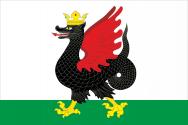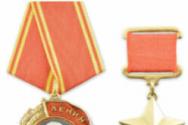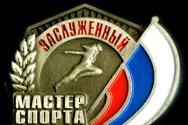Ostrovsky's play poverty is not a vice - heroes. The image and characterization of Lyubim Tortsov in the comedy poverty is not a vice by Ostrovsky essay
After his father’s funeral, Gordey divided the inheritance according to a scheme convenient for himself - he kept the establishment for himself, which brought in a stable income, and gave the difference to his brother in cash and valuable bills. The inheritance regularly “worked” for Gordey, his capital increased many times over, which gave him a heightened sense of pride. And Lyubim Karpych quickly squandered almost all his money, and the money that remained with him was deceived by the manufacturer Korshunov. In order not to starve, Lyubim was forced to earn extra money as a jester.
At the beginning of the story, the reader knows Gordey Karpych as a grumpy and demanding owner, who is irritated by everyone and everything around him, from close people to house guests. He tends to lash out at the clerk Mitya with demands “above his head”, he endlessly scolds his brother and believes that he is behaving unworthily and insultingly, Proudey openly considers his wife a stupid ignoramus who does not deserve respect.
Having gone on vacation to Moscow, the hero became ill with the desire to stay there forever. Now he is sure that his true place is in the highest circles and only in the capital. He no longer likes everything Russian; he wants to surround himself only with foreign and outlandish things. Gordey even had a corresponding friend - Afrikan Savich. The manufacturer has reliably ingratiated himself into the trust of the hero, who does not suspect that it was this rich old man who deceived his brother, and now aims to ruin him himself.
Gordey Karpych had already promised to marry his only daughter to Korshunov, but, fortunately, Lyubim exposed the fraudster in time, and the wedding did not take place. After what happened, Gordey reveals himself to the reader from a new, unfamiliar side of a person who knows how to realize his mistakes, repent of what he has done and be grateful for the help provided. He reconciles with the brother who rescued him, and gives his daughter down the aisle with the one who really loves her.
Quotes from Gordey Tortsov
Yes, I’ll arrange such a wedding as you have never seen: I’ll order musicians from Moscow, I’ll go alone in four carriages.
What tenderness in our poverty!
Why are you there? Is this where you belong? A crow flew into the high mansion!
Eh, if I were poor, I would be a man. Poverty is not a vice.
You know a lot! Well, there’s nothing to collect from you! You yourself are stupid, and your father isn’t very smart... he’s been walking around with a greasy belly for a whole century; You live as unenlightened fools, and you will die as fools.
The only form that protest can take among the dark merchants is the liberation of the individual from the bonds of his stuffy life... If the individual is cultured, many paths are open to him. If not, she, most often, turns out to be unsettled and dies: robbery, revelry, drunkenness, vagrancy - this is how this protest was expressed in ancient Rus'.
This protest resulted in such a popular, ancient form even in an atmosphere of merchant “tyranny.” In Ostrovsky’s comedy “Poverty is not a vice” (see its full text, summary and more detailed contents of individual actions: 1st, 2nd and 3rd), Lyubim Tortsov, brother of the tyrant Gordey, is introduced. By nature, possessing an ardent temperament, what is called a “broad nature”, during his father’s life in his own family, where, in all likelihood, tyranny also reigned, he inevitably had to restrain himself, submitting to the dominant force. The stronger this submission was, the more his passionate nature changed, the more powerfully the uncontrollable need for a “free will” should have awakened in him - the desire to give space to a soul striving for strong, varied impressions.
Ostrovsky. Poverty is not a vice. Performance, 1969
Lyubim swung wide when he broke free - revelry, debauchery, drunkenness, all kinds of hobbies - he experienced everything, not knowing where to look for true freedom. He soon squandered all his father's inheritance, became a drunkard, a tramp, and earned his living by buffoonery. But he didn’t drink, he didn’t waste his soul. We love, and she spoke to him: “Fear attacked me,” he says, “horror came over me. How did I live? What kind of business was I doing? I began to feel sad, so sad that it seemed better to die!”
Such soul-cleansing impulses of people in ancient Rus' usually led to the monastery (cf. “The Tale of Misfortune-Grief”), but Lyubim did not go to the monastery - he became a drunkard, did not work, perhaps because that his brother did not give him a helping hand when he asked for it. But under the rags of a tramp, he had an honest heart beating - truthful, grateful to those who were sympathetic to him.
Having experienced a lot of grief, Lyubim became responsive to the suffering of others; While idle himself, he, however, knows how to respect work. Smart and at the same time cunning, he cleverly thwarts Gordey’s intentions to marry his daughter Lyubov to old African Korshunov. He knows how to help the young man Mitya, who has tender feelings for Lyuba, and he also knows how to make him pity heart of stone Proud.
“Are you a man or a beast?” says We love our brother, kneeling in front of him. “Have pity on Lyubim Tortsov too! Brother, give Lyubushkuz to Mitya - he will give me a corner. I'm already cold and hungry. My summers are over, it’s hard for me to clown around in the cold just for a piece of bread; at least in old age, but live honestly! After all, I deceived the people, begged for alms, and got drunk myself. If they give me a job, I’ll have my own pot of cabbage soup. Then I will thank God. Brother! and my tears will reach the sky... Why is he poor! Eh, if I were poor, I would Human was. Poverty is not a vice!"
This heartfelt, strong speech expressed a purely Russian, common people’s view of life. In general, Ostrovsky’s entire play, abundant folk songs, sayings and proverbs, written in purely Russian beautiful language, made such an impression on contemporaries with its “nationality” that one of the contemporaries of the Slavophile poets sang of the Russian stage, renewed by this comedy, in the following verses:
There... now the native life is walking around;
There the Russian song flows freely and loudly,
There is a whole world there - a free and living world...
Great Russian life feasts on stage,
The Great Russian principle triumphs!..
Great Russian speech warehouse,
Great Russian mind, Great Russian look,
Like Mother Volga, wide and roaring!
“Wider the road - Love Tortsov is coming!” - this exclamation of the intoxicated Lyubim became a solemn cry that swept through Russian Slavophile literature after the publication of the comedy “Poverty is not a vice.” In Lyubim they saw the personification of the Russian national soul, the Russian mind and heart...
The fact that Ostrovsky chose a fallen man as the bearer of “national ideals” did not bother anyone. With a light hand
Article menu:
After the release of the play “Poverty is not a vice,” there was a furore in society—criticism of the work was not unambiguous. There were praisers of the play and those who expressed bewilderment and scolded, but there were no indifferent ones. According to the author's idea, the play should have been published under a different title - “God Resists the Proud.” It must contain two acts. But in the process of working on the work, both the theme changed (the author chose a more prosaic connotation) and plans for the volume of the play.
The plot of the play is quite simple - a merchant wants to marry his daughter against her will to an old but rich factory owner. A wedding with an old man does not attract the girl, the presence of her lover increases her dislike for the wedding - as a result of the conflict that has developed, the merchant's daughter marries for love a man with an unattractive financial situation.
The main characters of the play
Gordey Karpych
The play begins on the estate of Gordey Karpych Tortsov. This is where the main array of events depicted in the work takes place. This is a “rich merchant”, his age is not precisely indicated, the author limited himself to only a vague mention of “under sixty”. His father was not noble birth, however, the son managed to achieve more in life - he significantly improved the financial situation of his family and now it is difficult to imagine that “we had a little man.” Tortsov is a man with a complex character.
“Can you really talk to him?” they say about him. He does not want to take anyone’s opinion into account, of course, unless it is the opinion of a rich person who occupied a higher position in society than him.
He treats those around him unkindly (both servants and family members). He does not have the best attitude towards his impoverished brother - a feeling of shame for this state of affairs in front of people of higher rank takes its toll. It would be natural in this case to help my brother change his level of existence, but he does not want to. Gordey Karpych is interested in life in Moscow, everything new and unusual: “I want to live in the modern way, to be involved in fashion,” he says.
Tortsov sees the only way for his daughter to improve her social status- it’s beneficial to get married, and he doesn’t care much whether it will be good for his daughter to live with this man or not. After a quarrel and the cancellation of the wedding of Afrikan Savich and his daughter, Gordey Karpych becomes softer and more accommodating, and understands that listening to the opinions of others, even if they are lower than you in status and financial situation, is not so bad.
Lyubov Gordeevna
The second most important character is Lyubov Gordeevna, the daughter of Gordey Karpych. She is very beautiful, but poorly educated because she “didn’t study at a boarding school,” but she is sincere and kind, guided by the urges of her heart: “I say what I feel.”
The girl believes that the race for wealth is absurd; she sincerely believes that it is not high society, ranks or money that make people happy. Lyubov Gordeevna obediently fulfills her father's will; having learned about her father's intention to marry her off, she does not resist his will, but still asks her father not to marry her off to Afrikan Savich.

Love for Mitya overwhelms her and the feeling is mutual, but there is very little hope for a successful outcome of their love - her father does not consider her request. He thinks that it is better to live richly - it is impossible to achieve happiness in poverty.
We love Karpych
We love Karpych- brother of Gordey Karpych. Like his brother, Lyubim worked hard and was able to accumulate decent capital for himself. He lived well, drank often and led an idle life, but did not go to extremes until the moment when Afrikan Savich took over him. Lyubim became a beggar, he had to wander and beg for alms, which he also did not always spend wisely - he drank. Returning to his brother, he realized his mistakes and decided to “at least live honestly in his old age,” but not everything is so simple - his brother is busy with noble guests and plans to move further up the social ladder, he has no time for his poor brother. Lyubima is surprised that his brother puts material values higher than moral ones and gives preference to communicating with deceiving rich people, and ordinary people who live according to the laws of morality does not allow them to approach them. However, we like Karpych to hope that things will get better in his life. He does not stand aside when he finds out about his niece’s wedding - Lyubim cannot allow such a misfortune in the life of Lyubov and Mitya (who treats him very well and often helps him in difficult financial situations) - the scandal he created not only allows him to avoid an unnecessary wedding, but also resolves issues about relationships in the Tortsov family.
We invite you to familiarize yourself with summary plays by A. Ostrovsky, which highlight problems associated with unequal marriage.
African Savich Korshunov- a wealthy factory owner living in Moscow. That is why he is an excellent husband option for Lyubov Gordeevna.
Afrikan Savich is a lover of drinking and partying; when drunk, he behaves extremely violently and ill-mannered, but at the same time he considers himself a kind person: “I am a good, cheerful person,” “simple, I am a kind old man.”
He treats his enemies cruelly, so he the right decision for those who fall out of his favor will escape. Although his attitude towards close people is no better - he tortured his first wife with jealousy. But, in general, “nothing good, except bad, has been heard about him.”
Mitya
Mitya- “Tortsov’s clerk.” He has practically few relatives - only his mother, and even then she lives far away from him. Mitya helps her financially, so she often deprives herself of even the necessary things. Gordey Karpych will always find something to complain about - this greatly upsets the impressionable Mitya. Tortsov reproaches him for squandering, for the fact that Mitya wears an old frock coat and thus disgraces him in the eyes of visitors. The young man is calm by nature, kind and sympathetic, so those around him have a good opinion of him. He did not receive a good education and is now trying to achieve the desired result through his own efforts. He understands perfectly well that he cannot be the groom that Gordey Karpych will approve of - his difficult financial situation, his poverty have become a significant obstacle to the desired action, but he is not able to command his heart to forget Tortsov’s daughter.
Minor characters of the play
Pelageya Egorovna
Pelageya Egorovna is the wife of Gordey Karpych Tortsov. Despite the fact that she, as a mother, must take an active part in her daughter’s life, and therefore actively act in the play, Ostrovsky does not give her such powers; she minor character plays.

In general, she is a sweet, kind and warm-hearted woman. Those around her love her. In her youth, the woman loved to dance and sing, and happily took up these activities. Now she is old and her ardor has subsided. In addition, the not entirely successful marriage did its insidious work. She considers herself deeply unhappy, her husband does not value her, and in fact does not consider her a person: “I don’t dare say anything to him; unless you talk to a stranger about your grief, cry, let go of your soul, that’s all.” Over many years of married life, Pelageya Egorovna has come to terms with this attitude, so even in critical situations, such as with her daughter’s marriage, she does not contradict her husband and does not try to point out his error, although she clearly sees that this marriage will bring a lot of misfortune to her daughter .
Yasha Guslin
The next character is Yasha Guslin. He is also related to Tortsov (Gordey’s nephew). He's honest a kind person, but, unfortunately, he is poor, so his uncle does not indulge him with attention and praise. Pelageya Egorovna loves him for his kind disposition and love of music; she invites him to visit her so that he can sing and play the guitar. Yasha is friendly with Mitya and helps him in difficult situations: he stands up for him in front of Grisha, helps him meet Lyubov Gordeevna. He himself is in love with the poor widow Anna, but marrying a woman is not possible - his uncle does not want to give permission to the lovers to get married.
Anna Ivanovna
Guslin's beloved is a widowed woman, as poor as Yasha himself. Her name is Anna Ivanovna. She is a friend of the Tortsov family, but this does not help her to persuade her to agree to the wedding of Gordey Karpych. At the end of the play, everything changes and Anna and Yasha receive the long-awaited permission.
Grisha Razlyulyaev
Grisha Razlyulyaev- a young merchant, a rich heir. His father, like himself, does not chase fashion and does not strive to join new trends, which causes extreme disapproval from Gordey Karpych Tortsov, who has a low opinion of Grisha, reads him as a man of extraordinary intelligence. Razlyulyaev is a cheerful and good-natured person. He values his friendship with Mitya.
Thus, in Nikolai Ostrovsky's play Poverty is not a Vice, two opposing camps emerged. On the one hand, Gordey Karpych and Afrikan Savych, who are ready, in pursuit of wealth and position in society, to cross moral prohibitions and foundations, to sacrifice anything. On the other hand, we love Karpych, Lyubov Gordeevna, Pelageya Egorovna, Mitya, Yasha, Anna and Grisha. They sincerely believe that there should be good in the world, and the main thing is to live honestly, decently and according to conscience. As a result, good wins - Gordey changes his views, realizes the error of his actions - this allows him to avoid the life tragedies of almost all the characters in the play. Ostrovsky shows us through the example of Tortsov that there is no need to chase after something illusory and distant - you need to look for happiness nearby and appreciate those who are trying to bring at least a little happiness to you.
Ostrovsky pushes back love line to the background. It is important for him to depict the existence of true family values, the desire to break into high society at any cost, ignoring personal qualities and desires, the persistence of patriarchal traditions, because of this the play will gain new meaning is not just a story with a happy ending, but a way to point out the flaws of society in a comic form.
WE LOVE TORTSOV - the hero of A.N. Ostrovsky’s comedy “Poverty is not a vice” (1853, original title: “God Resists the Proud”). Spiritual appearance of L.T. became the center of critical and journalistic controversy surrounding the play. Slavophiles regarded its appearance as a “new word” in art, associated with the revelation of the national ideal. The hero’s exclamation “Wide the road - We love Tortsov is coming!” became for them a symbol of the victory of national principles in art. “Democratic” criticism was skeptical about both the excessive enthusiasm of the Slavophiles and the moral pathos of the image of L.T. The squandered brother of a rich merchant, L.T. walks around the city as a “buffoon”, collects pennies, “plays the joke of himself.” In revenge for his brother Gordey L.T. who kicked him out. “he acted in disgrace”: he went and stood with the beggars at the cathedral, disgracing his brother “throughout the whole city.”
At Christmas time, when “there is a holiday on the street, everyone has a holiday in the house,” the loneliness of L.T., whose soul is “frozen,” is felt more acutely. L.T.’s bitter buffoonery and the need to clown around for a piece of bread make him a “fool against his will.” In the behavior of L.T. features of conscious social self-destruction can be traced, making it similar to holy fools Ancient Rus'. His “decrepit burnus” is akin to the “thin vestments” in which holy fools, “swearing at the world,” denounced insignificance common sense and practical needs in the face of God's truth. L.T. remembers her when he exclaims: “And my tear will reach the sky!” L.T. does not wish or do harm to anyone, “does not eat up someone else’s age”, treats with compassion and love good people, angry and contemptuous - towards those who have forgotten shame and conscience. “A monster of nature,” he says about African Korshunov, who has lost the image of God in himself. The key to the image of L.T. is his passionate monologue, in which he asks his brother not to ruin his daughter’s happiness and to marry her for love to the poor clerk Mitya. As a result of the intervention of L.T. The “villain” Africanus is put to shame, the proud brother is “brought to his senses,” and the poor lovers are united. The words of Gordey’s wife reveal the meaning of the events that took place and the role of L.T. in them: “Love-fly, you took away a great sin from our soul, if only we could pray for it.” L.T. not just fallen man. The most important feature of his personality is the consciousness of his fall. In the image of L.T. Ostrovsky reveals a deeply national trait of the Russian character: the ability to fall low, but not lose moral purity, and in the very fall to retain the ability to distinguish between good and evil. Ostrovsky's comedy, written in line with the traditions of folk theater, is quite simple-minded. The almost parable plot, the monochromatic character, clearly divided into “proud” and “humble,” and the happy ending are reminiscent of the ancient genres of “tearful comedy” and folk melodrama. But the image of L.T. was an exception. Ostrovsky created it according to the laws of realistic art and thereby made comedy a significant event in the history of Russian theater. The impact of the image of L.T. had a noticeable impact in the works of F.M. Dostoevsky (Marmeladov in the novel “Crime and Punishment”) and L.N. Tolstoy (Fedya Protasov in the drama “The Living Corpse”). The first performer of the role of L.T. was P.M. Sadovsky (1854), to whom Ostrovsky dedicated the comedy. Other performers include V.V. Samoilov (1854), M.S. Shchepkin (1855), P.V. Vasiliev (1861), A.A. Ostuzhev (1934).







